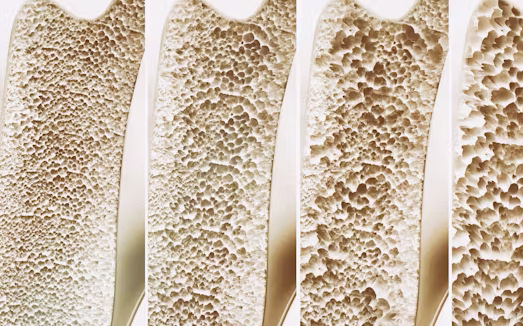In a recent Instagram post, actress Jameela Jamil revealed she has poor bone density, despite only being in her 30s. She blamed this on 20 years of dieting and urged her followers to be aware of the harms diet culture can do to your health.
Bone density is important for many reasons, primarily because it acts as a reservoir for many of the important minerals our bones need to function well. Many factors can affect your bone density and diet has a significant effect on bone health.
Bone is a living tissue. This means our skeleton grows and remodels itself according to the stresses and strains it’s put under.
The biggest skeletal changes we experience happen in our younger years. But bones keep changing throughout our lives depending on how active we are, what our diet consists of and if we’ve suffered an injury or disease.
Bones are made of proteins, such as collagen, as well as minerals – largely calcium. This key mineral keeps our bones and teeth strong and helps repair and rebuild any injured bones.
But other minerals and vitamins are also important. For example, vitamin D supports calcium, playing a key role in bone mineralisation. This is where calcium combines with phosphate in our bones to create the mineral crystal hydroxyapatite which is crucial to our bone mineral density (bone mass), helping bones remodel and maintain their structural strength.
We hit peak bone mineral density in our late teens and early 20s, from here, it’s possible to maintain stable bone mass into your late 30s for women and early 40s for men, with the right diet and activity. But after this point, it begins to decline.
Bone density
We accrue calcium over many years. It initially comes from our mother, then later our diet. Our body accrues calcium so it can adapt to times when calcium demand is greater than what we can get from our diet – such as during pregnancy, when the foetus needs calcium to build its own bones.
However, relying solely on this skeletal calcium reserve can’t be sustained for lengthy periods, because of how long it takes to be replenished. This is why diet is so important for bone density.
Studies have shown consuming carbonated drinks more than four times a week is linked with lower bone density and increased fracture risk. Carbonated and energy drinks contain few vitamins – often with none of the minerals, including calcium, that the body needs to function optimally. This causes the body to draw on its reserves if calcium isn’t being delivered elsewhere in the diet.
Diets high in added sugar can also have a detrimental affect on the skeleton. Excess sugar causes inflammation and other physiological changes, such as obesity. Consuming high amounts of sugar is linked with reduced calcium intake, especially in children who substitute milk for sugary drinks. Excess sugar consumption also causes the body to excrete excess calcium, instead of reabsorbing it in the kidney as the body normally would.
Low- and high-fat diets have also been associated with increased risk of osteoporosis in women – though larger studies are needed to better understand the effects of removing whole food groups on bone health.

Anorexia nervosa also has a significant affect on bone density – affecting a majority of people with the condition.
Low bone mineral density – especially in the spine – puts people with anorexia at increased risk of fractures because their bone thickness is reduced, increasing the likelihood of developing osteoporosis, which is associated with increased fractures.
Anorexia in young adulthood is particularly challenging. This is the stage where the skeleton is building itself to reach peak bone mass, so it’s depositing calcium at a record pace. When diet is insufficient and the body already starts drawing on its mineral reserves, there’s a potential that the bone density or calcium reserves in the body will never be optimal.
Can bone health be fixed?
Optimal bone health starts in utero, but our prepubescent years are key to setting our skeleton up for later life. People who are behind the curve in early life may have difficulty achieving their peak, as poor bone mineral density can affect everything from our appetite to how efficient our gastrointestinal tract is at absorbing important nutrients (including calcium).
Supplements have a limited effect because our body can only absorb a set amount of any vitamin or mineral at a time.
While it’s possible to limit some of the decline in bone density that naturally happens as we age, some of the choices we make – such as not consuming enough calcium – can accelerate the decline. – The Conversation
- * Adam Taylor is professor and director of the Clinical Anatomy Learning Centre, Lancaster University.
Stay informed with The Namibian – your source for credible journalism. Get in-depth reporting and opinions for
only N$85 a month. Invest in journalism, invest in democracy –
Subscribe Now!






